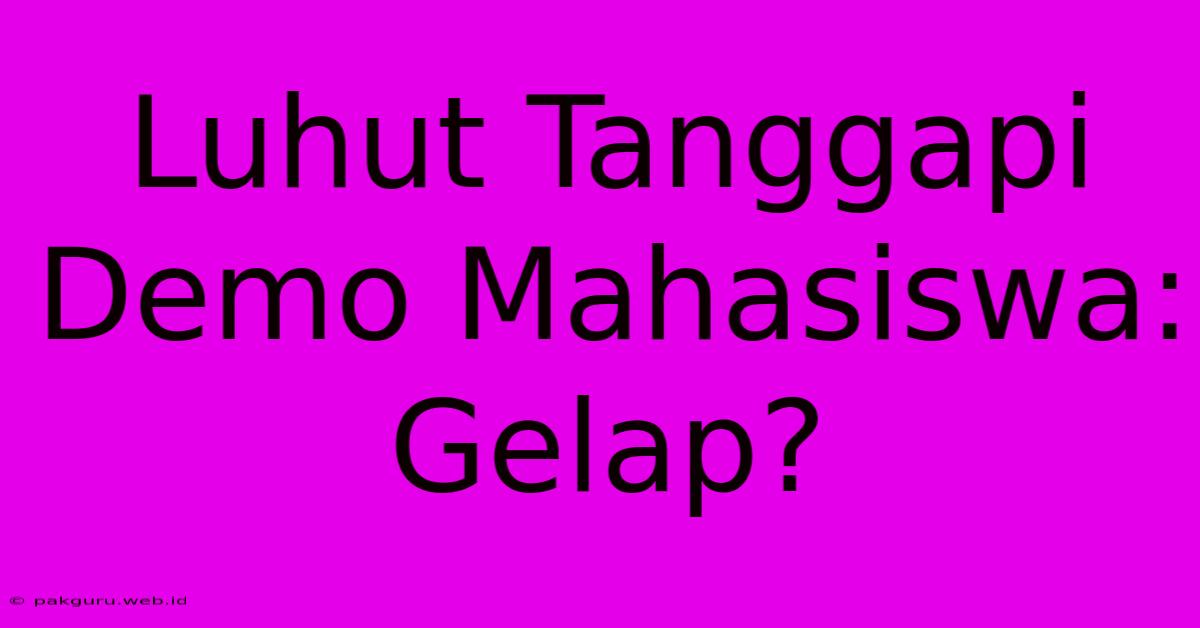Luhut Tanggapi Demo Mahasiswa: Gelap?

Discover more detailed and exciting information on our website. Click the link below to start your adventure: Visit Best Website wanagama.com. Don't miss out!
Table of Contents
Luhut Tanggapi Demo Mahasiswa: Gelap? Menjelang Pemilu 2024, Kritik dan Respon Pemerintah
Indonesia's political landscape is heating up, particularly with the upcoming 2024 elections. Recent student demonstrations have brought several key issues to the forefront, prompting strong reactions from government officials. One prominent figure, Coordinating Minister Luhut Binsar Pandjaitan, has faced significant scrutiny for his responses to these protests, leading to accusations that his statements are dismissive and out of touch. This article delves into Luhut's response to student demonstrations, analyzes the criticisms leveled against him, and explores the broader context of political discourse in Indonesia.
The Context: Student Protests and Key Demands
Student-led protests are a long-standing tradition in Indonesia, often serving as a vital check on government power and a platform for voicing public grievances. These recent demonstrations focused on several critical concerns, including:
- Economic Inequality: Rising living costs, particularly food and fuel prices, have disproportionately impacted vulnerable populations, fueling widespread discontent.
- Environmental Concerns: Issues surrounding deforestation, pollution, and the impact of resource extraction on local communities have sparked significant activism.
- Political Reform: Calls for greater transparency, accountability, and a fairer electoral system are central to many student protests.
These protests represent a diverse range of demands, united by a common thread of concern over the current trajectory of Indonesian politics and the well-being of its citizens.
Luhut's Response: Accusations of Dismissal and "Gelap" (Dark) Remarks
Luhut's responses to these student demonstrations have been met with considerable criticism. Many perceive his comments as dismissive and lacking in empathy. The use of the term "gelap" (dark), in particular, has drawn strong condemnation. While the exact context and intended meaning of "gelap" may be subject to interpretation, it's been widely perceived as implying that the protestors are ill-informed or have ulterior motives.
This perceived dismissiveness has fueled accusations that the government is failing to adequately address the serious concerns raised by the students. The criticism highlights a growing disconnect between the government and the public, particularly among younger generations who are increasingly vocal in their demands for change.
Analyzing the Criticism: A Breakdown of Public Sentiment
The public reaction to Luhut's statements reflects a deeper societal unease. Many argue that his response lacks the nuance and understanding required to engage with legitimate concerns. The criticism transcends mere political disagreement; it reflects a widespread feeling that the government is not effectively addressing the root causes of public dissatisfaction.
The use of the word "gelap" is seen as particularly damaging, further widening the gap between the government and the protesting students. This has prompted widespread debate on the government's communication strategy and its ability to engage constructively with dissenting voices.
The Broader Implications: Towards the 2024 Elections
Luhut's response, and the public reaction to it, takes on added significance in the lead-up to the 2024 elections. The student protests, and the government's response to them, will likely shape the political landscape in the coming months. The level of public dissatisfaction, amplified by perceived government dismissiveness, could significantly influence electoral outcomes.
This situation underscores the importance of open dialogue and constructive engagement between the government and its citizens. Ignoring or dismissing legitimate grievances risks further fueling discontent and instability.
Conclusion: The Need for Dialogue and Understanding
The ongoing student protests and the government's response, particularly Luhut's remarks, highlight a critical juncture in Indonesian politics. The need for open communication, empathy, and a willingness to address underlying issues is paramount. Moving forward, fostering a more inclusive and responsive political environment is crucial to ensure stability and progress in the lead-up to the crucial 2024 elections. Only through genuine dialogue and a commitment to addressing the concerns of all citizens can Indonesia navigate these challenging times effectively.

Thank you for visiting our website wich cover about Luhut Tanggapi Demo Mahasiswa: Gelap?. We hope the information provided has been useful to you. Feel free to contact us if you have any questions or need further assistance. See you next time and dont miss to bookmark.
Featured Posts
-
Madrid Kalah 3 1 Mbappe Gempur City
Feb 20, 2025
-
Mbappe Gacor Real Madrid Singkirkan Man City
Feb 20, 2025
-
Dramatis Mbappe Hattrick Bawa Real Menang
Feb 20, 2025
-
Juventus Tersingkir Kalah 1 3 Dari Psv
Feb 20, 2025
-
I Phone 16 E Rilis Fitur Canggih Harga
Feb 20, 2025
